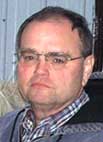 A rare warm day in December is a welcome reprieve for anyone from the frigid grey clouds of winter. Yet, for a cattle rancher like Steve Parker warm weather is a blessing. Standing in the field overlooking part of his 1,200-acre farm in Aurora, Mo., there is no question how much Steve enjoys being a cattle rancher.
A rare warm day in December is a welcome reprieve for anyone from the frigid grey clouds of winter. Yet, for a cattle rancher like Steve Parker warm weather is a blessing. Standing in the field overlooking part of his 1,200-acre farm in Aurora, Mo., there is no question how much Steve enjoys being a cattle rancher.
Steve’s farm began 35 years ago when he purchased the family farm from his father. Of course, over the years Steve has expanded his cattle ranch a little bit at a time. Of Steve’s 1,200 acres, he is fortunate to lease several tracts of land from neighbors. “I have great landlords, without them I couldn’t do what I do at this size.” Steve runs about 150 cows, near 500 yearlings and 9 bulls. “We have a little bit of everything as far as breeds go, but some of my cows are Charolais cross.” Steve’s goal is to find good calves and get them to a weight of 800-900 pounds before he takes them to the sale barn or to several feedlots in Kansas. “In our business we get paid by the pound so it’s pretty simple; the bigger the calf the bigger the check,” explained Steve.
Steve also grows his own mix of rye, fescue and clover hay and uses some corn silage in the winter months. Along with his hay, Steve plants a few acres of turnips before the winter season to supplement as well.
Despite the warmth of the day, Steve insists that winter brings more difficulties to the ranch and time seems to be spread thinner, “We spend an awful lot of time feeding the cattle in the winter. It’s pretty much daylight to dark, 7 days a week. There just seems to be a lot more trouble in the winter.”
For Steve, ranching hasn’t always been the easiest. “At times it has been a real struggle. For me, the mid ‘80s was the most difficult time. We saw a lot of really good farmers lose their farm at that time. I have always believed this country was built by people that took risk and unfortunately those were the kind of people that ended up losing out in the ‘80s and that’s kind of a sad thing.” Nevertheless, Steve firmly believes that “no risk, no reward” is the only way to be successful as a cattle rancher. “So, we still take a lot of risk, even though sometimes risk hurts.”
In light of the recent economic state, Steve is confident in the cattle ranching business. “Right now, the market is really good. We’re really in a good spot. Prices are really good. Actually, they are the highest I have seen in my lifetime. Now, this is due in part to the recent droughts cutting supply down.” Steve does see supply growing in the future and prices will be a little cheaper, “The cattle business runs in cycles and we’re at the top right now. Cattlemen will expand enough to where we have lower prices someday because we always do. However, I do think we better enjoy our markets now.” Steve does admit that ranchers really need the current prices to continue considering how high expense costs have gotten.
Steve is very thankful for his family and acknowledges that without their help, his business would be near impossible. Steve’s has three sons: Nick, Landon and Jessie. Nick and Jessie, along with Steve’s nephew, Josh, live close and help Steve as much as they can. Landon lives in Kansas City and works at a hospital. Steve said he owes a lot to his wife, Deanna. “It’s not easy being a cattleman’s wife. There is a lot of times I’ve had to miss things and she’s had to put up with a lot.” Steve laughed, “I remember on one of our first dates, I had to pull a calf and she helped me. Her hand got stuck in the OB chain and I told her I would have to tighten it down more before she was able to get free and it was going to hurt a little bit more. After that, she could have run, but she didn’t. She stayed right there.”
Steve’s favorite part of being a cattle rancher is just the cattle. “I just like the cattle. I like watching them, caring for them. I take a lot of pride in caring for them. I guess cattle ranchers are a little bit different than most people. We like taking care of our cattle so much that if the government said we had to pay to do this we would go ahead and get out our checkbooks,” Steve concluded.







